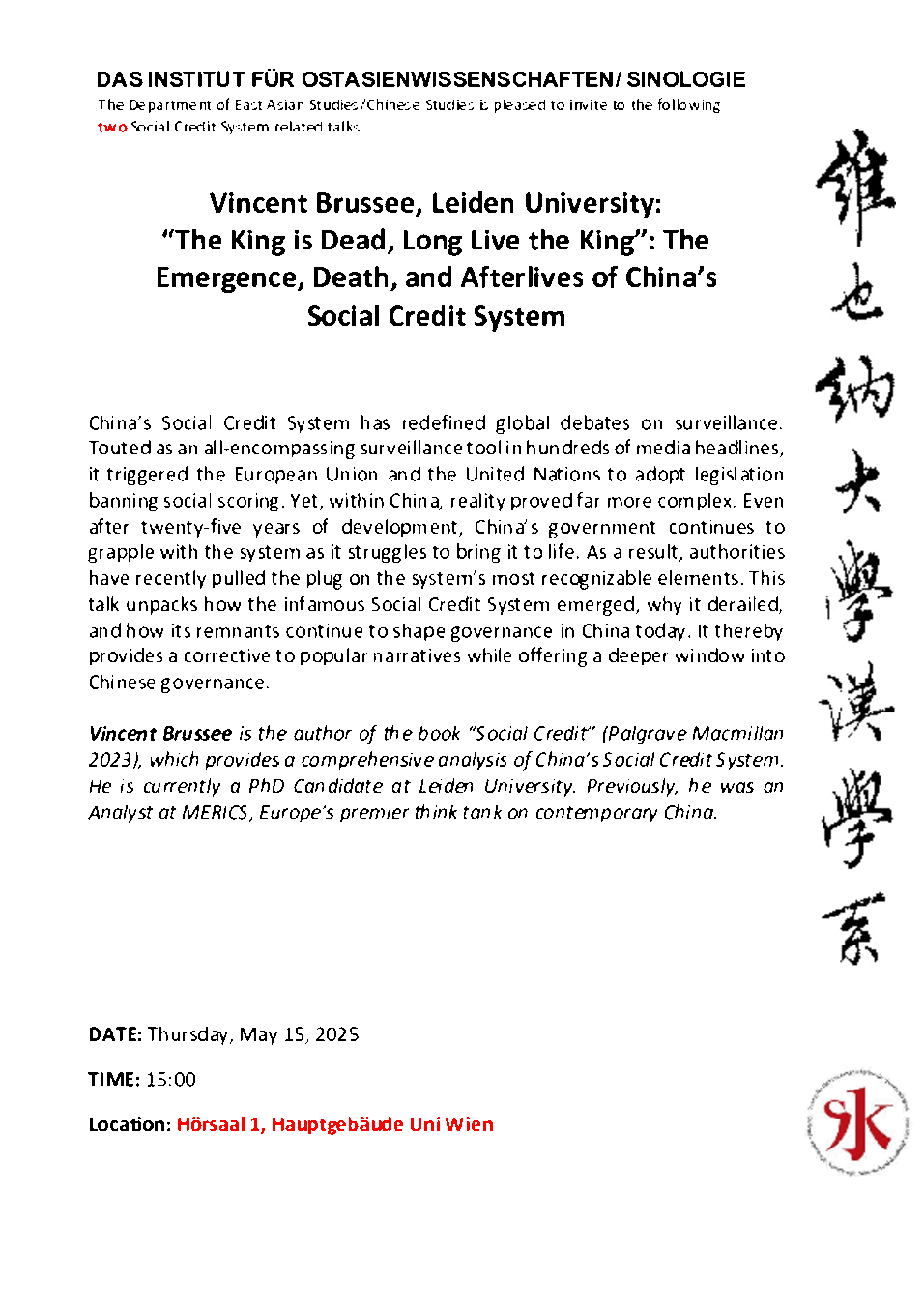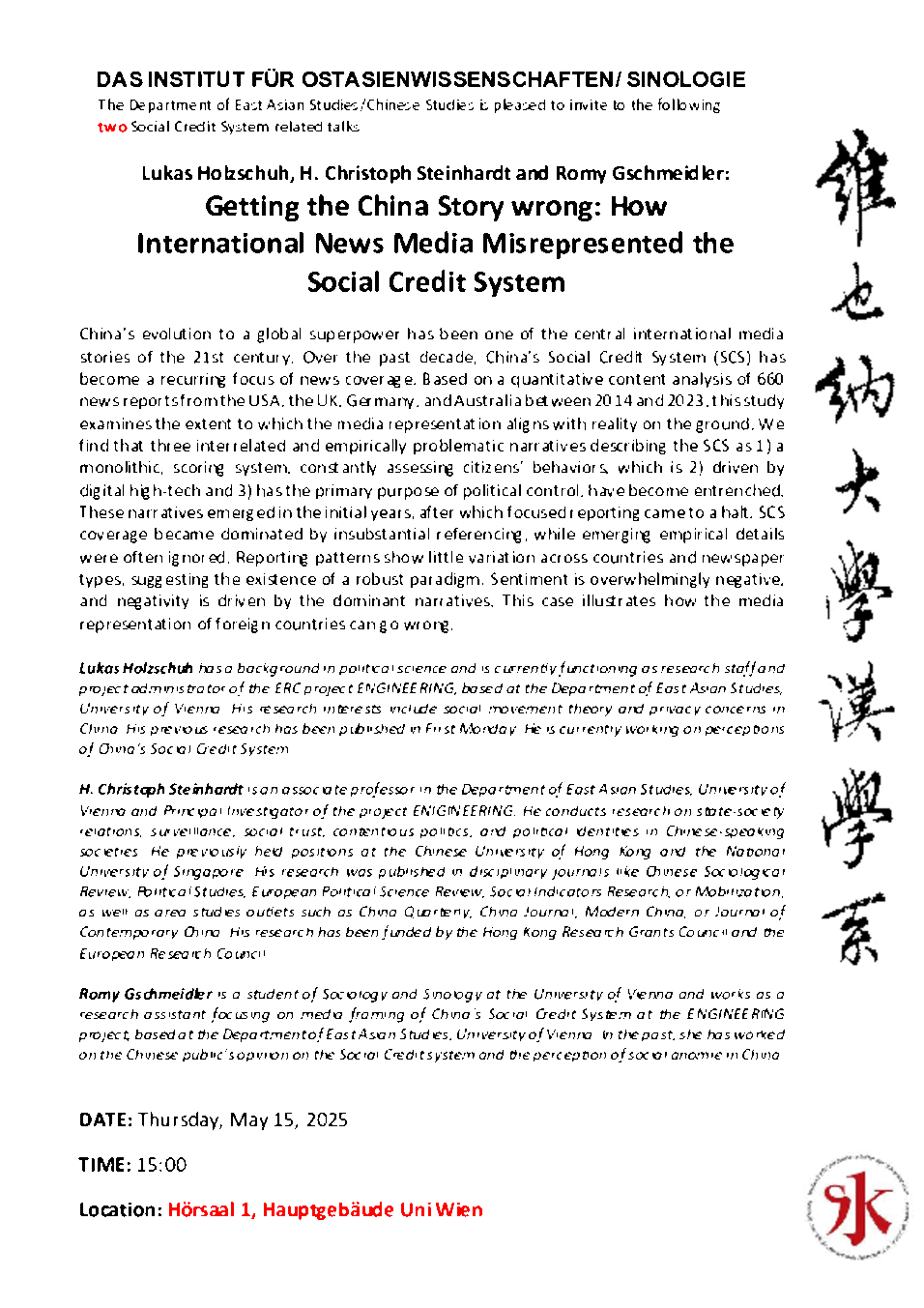Lecture 1:
Vincent Brussee, Leiden University: “The King is Dead, Long Live the King”: The Emergence, Death, and Afterlives of China’s Social Credit System
China’s Social Credit System has redefined global debates on surveillance. Touted as an all-encompassing surveillance tool in hundreds of media headlines, it triggered the European Union and the United Nations to adopt legislation banning social scoring. Yet, within China, reality proved far more complex. Even after twenty-five years of development, China’s government continues to grapple with the system as it struggles to bring it to life. As a result, authorities have recently pulled the plug on the system’s most recognizable elements. This talk unpacks how the infamous Social Credit System emerged, why it derailed, and how its remnants continue to shape governance in China today. It thereby provides a corrective to popular narratives while offering a deeper window into Chinese governance.
Vincent Brussee is the author of the book “Social Credit” (Palgrave Macmillan 2023), which provides a comprehensive analysis of China’s Social Credit System. He is currently a PhD Candidate at Leiden University. Previously, he was an Analyst at MERICS, Europe’s premier think tank on contemporary China.
Lecture 2:
Lukas Holzschuh, H. Christoph Steinhardt and Romy Gschmeidler:
Getting the China Story wrong: How International News Media Misrepresented the Social Credit System
China’s evolution to a global superpower has been one of the central international media stories of the 21st century. Over the past decade, China’s Social Credit System (SCS) has become a recurring focus of news coverage. Based on a quantitative content analysis of 660 news reports from the USA, the UK, Germany, and Australia between 2014 and 2023, this study examines the extent to which the media representation aligns with reality on the ground. We find that three interrelated and empirically problematic narratives describing the SCS as 1) a monolithic, scoring system, constantly assessing citizens’ behaviors, which is 2) driven by digital high-tech and 3) has the primary purpose of political control, have become entrenched. These narratives emerged in the initial years, after which focused reporting came to a halt. SCS coverage became dominated by insubstantial referencing, while emerging empirical details were often ignored. Reporting patterns show little variation across countries and newspaper types, suggesting the existence of a robust paradigm. Sentiment is overwhelmingly negative, and negativity is driven by the dominant narratives. This case illustrates how the media representation of foreign countries can go wrong.
Lukas Holzschuh has a background in political science and is currently functioning as research staff and project administrator of the ERC project ENGINEERING, based at the Department of East Asian Studies, University of Vienna. His research interests include social movement theory and privacy concerns in China. His previous research has been published in First Monday. He is currently working on perceptions of China’s Social Credit System.
H. Christoph Steinhardt is an associate professor in the Department of East Asian Studies, University of Vienna and Principal Investigator of the project ENIGINEERING. He conducts research on state-society relations, surveillance, social trust, contentious politics, and political identities in Chinese-speaking societies. He previously held positions at the Chinese University of Hong Kong and the National University of Singapore. His research was published in disciplinary journals like Chinese Sociological Review, Political Studies, European Political Science Review, Social Indicators Research, or Mobilization, as well as area studies outlets such as China Quarterly, China Journal, Modern China, or Journal of Contemporary China. His research has been funded by the Hong Kong Research Grants Council and the European Research Council.
Romy Gschmeidler is a student of Sociology and Sinology at the University of Vienna and works as a research assistant focusing on media framing of China’s Social Credit System at the ENGINEERING project, based at the Department of East Asian Studies, University of Vienna. In the past, she has worked on the Chinese public’s opinion on the Social Credit system and the perception of social anomie in China.
For more information, please refer to the attached PDF
DATE: Thursday, May 15, 2025
TIME: 15:00
LOCATION : Hörsaal 1, Hauptgebäude Uni Wien


